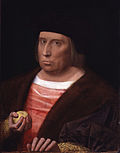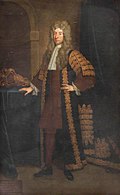Chancellor of the Exchequer
National Security Council | |
|---|---|
| Reports to | First Lord of the Treasury (Prime Minister of the United Kingdom) |
| Residence | 11 Downing Street |
| Seat | Westminster |
| Nominator | The Prime Minister |
| Appointer | The Monarch (on the advice of the Prime Minister) |
| Term length | At His Majesty's pleasure |
| Formation | c. 1221 |
| First holder | Eustace of Fauconberg (in the Kingdom of England only) |
| Deputy | Chief Secretary to the Treasury |
| Salary | £163,891 per annum (2024)[1] (including £91,346 MP salary)[2] |
| Website | Official website |
The chancellor of the exchequer, often abbreviated to chancellor,
Responsible for all economic and financial matters, the role is equivalent to that of a
The chancellor is the third-oldest major state office in
Since 1718, all chancellors of the exchequer, except at times the
The office holder works alongside the other
The current chancellor is Rachel Reeves.
Second Lord of the Treasury
The holder of the office of chancellor of the exchequer is
Since 1827, the chancellor has always simultaneously held the office of second lord of the Treasury when that person has not also been the prime minister.
Roles and responsibilities
A previous chancellor, Robert Lowe, described the office in the following terms in the House of Commons, on 11 April 1870: "The Chancellor of the Exchequer is a man whose duties make him more or less of a taxing machine. He is entrusted with a certain amount of misery which it is his duty to distribute as fairly as he can."
Fiscal policy
The chancellor has considerable control over other departments as it is the Treasury that sets Departmental Expenditure Limits. The amount of power this gives to an individual chancellor depends on their personal forcefulness, their status within their party and their relationship with the prime minister.
One part of the chancellor's key roles involves the framing of the annual year
The budget is a state secret until the chancellor reveals it in the speech given to Parliament. Hugh Dalton, on his way to giving the budget speech in 1947, inadvertently blurted out key details to a newspaper reporter, and they appeared in print before he made his speech. Dalton was forced to resign.[9]
Monetary policy
Although the
Ministerial arrangements
At
The chancellor is obliged to be a member of the
Perquisites of the office
Official residence
The chancellor of the Exchequer has no official London residence as such but since 1828 in their role as Second Lord of the Treasury they live in the second lord's official residence, No. 11 Downing Street.[12] In 1997, the then first and second Lords, Tony Blair and Gordon Brown respectively, swapped apartments, as the chancellor's larger apartment in No. 11 better accommodated Blair's substantial family (besides himself and his wife, he had three children under 18 upon taking office, and a fourth was born in 2000); meanwhile, Brown was then unmarried and had no children.
Dorneywood
Dorneywood is the summer residence that is traditionally made available to the chancellor, though it is the prime minister who ultimately decides who may use it. Gordon Brown, on becoming chancellor in 1997, refused to use it and the house, which is set in 215 acres (87 ha)[13] of parkland, was allocated to Deputy Prime Minister John Prescott. In 2007, it reverted to the then-chancellor, Alistair Darling.[14]
Budget box
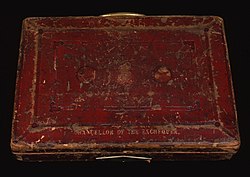
The chancellor traditionally carries their budget speech to the House of Commons in a particular red despatch box. The so-called ‘Budget Box’ is identical to the cases used by all other government ministers (known as ministerial boxes or "despatch boxes") to transport their official papers, but is better known because the chancellor traditionally displays the box, containing the budget speech, to the press before leaving 11 Downing Street for the House of Commons.
The original budget box was first used by William Ewart Gladstone in 1853 and continued in use until 1965 when James Callaghan was the first chancellor to break with tradition when he used a newer box. Prior to Gladstone, a generic red despatch box of varying design and specification was used. The practice is said to have begun in the late 16th century, when Queen Elizabeth I's representative Francis Throckmorton presented the Spanish Ambassador, Bernardino de Mendoza, with a specially constructed red briefcase filled with black puddings.[15]
In July 1997, Gordon Brown became the second chancellor to use a new box for the Budget. Made by industrial trainees at Babcock Rosyth Defence Ltd ship and submarine dockyard in Fife, the new box is made of yellow pine, with a brass handle and lock, covered in scarlet leather and embossed with the Royal cypher and crest and the chancellor's title. In his first Budget, in March 2008, Alistair Darling reverted to using the original budget box and his successor, George Osborne, continued this tradition for his first budget, before announcing that it would be retired due to its fragile condition.[16] The key to the original budget box has been lost.[17]
Budget tipple
By tradition, the chancellor has been allowed to drink whatever they wish while making the annual budget speech to Parliament. This includes alcohol, which is otherwise banned under parliamentary rules.
Previous chancellors have opted for whisky (
The chancellors after Clarke, Philip Hammond, George Osborne, Alistair Darling and Gordon Brown,[19] opted for water. In fact Darling drank what was named "Standard Water" in reference to, and support of, the London Evening Standard newspaper's campaign to have plain tap water available in restaurants at no charge to customers.[20]
Robe of office
The chancellor, as
List of chancellors of the exchequer
England (c. 1221 – c. 1558)
- ^† Died in office.
- ^ Served until 1264.
- ^ Lord Lancaster served as Regent of England during the minority of Edward III.
- ^ The Regency government led by the Regency Council governed England during the minority of Henry VI.
- ^ The Duke of Gloucester served as Regent of England during the reign of Edward V.
- ^ Served until 1488.
- Margaret Beaufortserved as Regent of England during the minority of Henry VIII.
- ^ The Duke of Somerset and Duke of Northumberland served as Regent of England successively during the reign of Edward VI.
England (c. 1558 – 1708)
| Chancellor of the Exchequer[a] | Term of office | Monarch (Reign) | ||||
|---|---|---|---|---|---|---|

|
Richard Sackville[24] MP for Sussex |
February 1559 |
21 April 1566† |
Elizabeth I (1558–1603) | ||

|
Walter Mildmay[24] MP for Northamptonshire |
1566 | 31 May 1589† | |||

|
John Fortescue[24] |
1589 | 1603 | |||

|
George Home 1st Earl of Dunbar[24] |
24 May 1603 |
April 1606 |
James I (1603–1625) | ||

|
Julius Caesar[24] MP for Middlesex |
11 April 1606 |
1614 | |||

|
Fulke Greville[24] MP for Warwickshire[1558 3] |
15 October 1614 |
1621 | |||

|
Richard Weston[24] MP for 7 constituencies successively |
29 January 1621 |
15 July 1628 | |||
Charles I (1625–1649) | ||||||

|
Edward Barrett 1st Lord Barrett of Newburgh[24] |
14 August 1628 |
1629 | |||

|
Francis Cottington 1st Baron Cottington[24] |
18 April 1629 |
6 January 1642 | |||

|
John Colepeper[24] MP for Kent |
6 January 1642 |
22 February 1643 | |||

|
Edward Hyde[24] | February 1643 |
1646 | |||
| Vacancy during the Interregnum (1649–1660)
| ||||||
| Chancellor of the Exchequer[a] | Term of office | Ministry | Monarch (Reign) | |||

|
Edward Hyde 1st Baron Hyde[24] |
1660 | 13 May 1661 |
Clarendon | 1660–1685 )
| |

|
Anthony Ashley Cooper 1st Baron Ashley[24] |
13 May 1661 |
22 November 1672 | |||
| Cabal | ||||||

|
John Duncombe[24] MP for Bury St Edmunds |
22 November 1672 |
2 May 1676 | |||
| Danby I | ||||||
| | John Ernle[24] MP for 4 constituencies successively |
2 May 1676 |
9 April 1689 | |||
| Privy Council | ||||||
| | Chits | |||||
James II (1685–1688) | ||||||
| | William III & Mary II  (1689–1694) | |||||

|
Henry Booth 2nd Baron Delamer[24] |
9 April 1689 |
18 March 1690 |
Carmarthen–Halifax | ||

|
Richard Hampden[24] MP for Buckinghamshire |
18 March 1690 |
10 May 1694 |
Carmarthen | ||

|
Charles Montagu[24] |
10 May 1694 |
31 May 1699 |
Whig Junto I | ||
William III (1694–1702) | ||||||
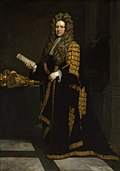
|
John Smith[24] MP for Andover |
31 May 1699 |
23 March 1701 |
Pembroke | ||
| | Henry Boyle[24] |
27 March 1701 |
22 April 1708 | |||

|
Godolphin–Marlborough (Tory–Whig) |
Anne (1702–1714) | ||||
- 9th Parliament of Queen Elizabeth I.
- ^ Served from 1601 prior to the Golden Speech.
- 3rd Parliament of King James Iin 1621.
- ^ Elected to a new constituency in the 1695 general election.
- ^ Elected to a new constituency in the 1705 general election.
Great Britain (1708–1817)
- ^ Lord Parker served as Regent of Great Britain from 1 August to 18 September 1714.
- ^ Elevated to the Peerage of Great Britain on 6 February 1742.
- ^ Elected to a new constituency in the Hampshire by-election.
- Prince of Wales served as prince regentfrom 5 February 1811.
- ^ Elected to a new constituency in the 1784 general election.
- ^ Elected to a new constituency in the 1812 general election.
United Kingdom (1817–present)
Although the Kingdoms of
| Chancellor of the Exchequer[a] | Term of office | Party | Ministry | Monarch (Reign) | |||
|---|---|---|---|---|---|---|---|

|
Nicholas Vansittart[24] MP for Harwich |
12 July 1817 | 31 January 1823 | Tory | Liverpool | George III (1760–1820) [1817 1] | |
George IV (1820–1830) | |||||||

|
Frederick John Robinson[28] MP for Ripon |
31 January 1823 | 27 April 1827 | Tory | |||

|
George Canning[29] MP for Seaford |
27 April 1827 | 8 August 1827† | Tory | Canning (Canningite–Whig) | ||

|
Lord Chief Justice (interim)
|
8 August 1827 | 5 September 1827 | Tory | Goderich | ||
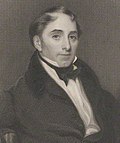
|
John Charles Herries[30] MP for Harwich |
5 September 1827 | 26 January 1828 | Tory | |||

|
Henry Goulburn[24] MP for Armagh |
26 January 1828 | 22 November 1830 | Tory | Wellington–Peel | ||
William IV (1830–1837) | |||||||

|
John Spencer Viscount Althorp[24] |
22 November 1830 | 14 November 1834 | Whig | Grey | ||
| Melbourne I | |||||||

|
Lord Chief Justice (interim)
|
14 November 1834 | 15 December 1834 | Whig | Wellington Caretaker | ||

|
Robert Peel[24] MP for Tamworth |
15 December 1834 | 8 April 1835 | Conservative | Peel I | ||

|
Thomas Spring Rice[24] MP for Cambridge |
18 April 1835 | 26 August 1839 | Whig | Melbourne II | ||
Victoria (1837–1901) | |||||||
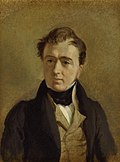
|
Francis Baring[24] MP for Portsmouth |
26 August 1839 | 30 August 1841 | Whig | |||

|
Henry Goulburn[24] MP for Cambridge University |
3 September 1841 | 27 June 1846 | Conservative | Peel II | ||

|
Charles Wood[24] MP for Halifax |
6 July 1846 | 21 February 1852 | Whig | Russell I | ||

|
Benjamin Disraeli[24] MP for Buckinghamshire |
27 February 1852 | 17 December 1852 | Conservative | Who? Who?
| ||

|
William Ewart Gladstone[24] MP for Oxford University |
28 December 1852 | 28 February 1855 | Peelite | Aberdeen (Peelite–Whig) | ||

|
George Cornewall Lewis[24] MP for Radnor |
28 February 1855 | 21 February 1858 | Whig | Palmerston I | ||

|
Benjamin Disraeli[24] MP for Buckinghamshire |
26 February 1858 | 11 June 1859 | Conservative | Derby–Disraeli II | ||

|
William Ewart Gladstone[24] |
18 June 1859 | 26 June 1866 | Liberal | Palmerston II | ||
| Russell II | |||||||

|
Benjamin Disraeli[24] MP for Buckinghamshire |
6 July 1866 | 29 February 1868 | Conservative | Derby–Disraeli III | ||

|
George Ward Hunt[24] MP for North Northamptonshire |
29 February 1868 | 1 December 1868 | Conservative | |||

|
Robert Lowe[24] MP for London University |
9 December 1868 | 11 August 1873 | Liberal | Gladstone I | ||

|
William Ewart Gladstone[24] MP for Greenwich |
11 August 1873 | 17 February 1874 | Liberal | |||
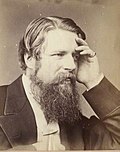
|
Stafford Northcote[24] MP for North Devonshire |
21 February 1874 | 21 April 1880 | Conservative | Disraeli II | ||

|
William Ewart Gladstone[24] MP for Midlothian |
28 April 1880 | 16 December 1882 | Liberal | Gladstone II | ||

|
Hugh Childers[24] MP for Pontefract |
16 December 1882 | 9 June 1885 | Liberal | |||

|
Bristol West
|
24 June 1885 | 28 January 1886 | Conservative | Salisbury I | ||

|
William Harcourt[24] MP for Derby |
6 February 1886 | 20 July 1886 | Liberal | Gladstone III | ||

|
Paddington South
|
3 August 1886 | 22 December 1886 | Conservative | Salisbury II | ||
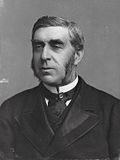
|
George Goschen[24] MP for St George Hanover Square |
14 January 1887 | 11 August 1892 | Liberal Unionist
| |||

|
William Harcourt[24] MP for Derby |
18 August 1892 | 21 June 1895 | Liberal | Gladstone IV | ||
| Rosebery | |||||||

|
Bristol West
|
29 June 1895 | 11 August 1902 | Conservative | Salisbury (III & IV) (Con.–Lib.U.) | ||
Edward VII (1901–1910) | |||||||

|
Charles Ritchie[24] MP for Croydon |
11 August 1902 | 9 October 1903 | Conservative | Balfour | ||

|
East Worcestershire
|
9 October 1903 | 4 December 1905 | Liberal Unionist
| |||

|
Herbert Henry Asquith[24] MP for East Fife |
10 December 1905 | 16 April 1908 | Liberal | Campbell-Bannerman | ||

|
Caernarvon Boroughs
|
16 April 1908 | 25 May 1915 | Liberal | Asquith (I–III) | ||
George V (1910–1936) | |||||||

|
North Monmouthshire
|
25 May 1915 | 10 December 1916 | Liberal | Asquith Coalition (Lib.–Con.–et al.) | ||

|
Bonar Law[24] |
10 December 1916 | 10 January 1919 | Conservative | Lloyd George (I & II) | ||

|
Austen Chamberlain[24] MP for Birmingham West |
10 January 1919 | 1 April 1921 | Conservative | |||

|
Glasgow Hillhead
|
1 April 1921 | 19 October 1922 | Conservative | |||

|
Stanley Baldwin[24] MP for Bewdley |
27 October 1922 | 27 August 1923 | Conservative | Law | ||
| | Baldwin I | ||||||

|
Birmingham Ladywood
|
27 August 1923 | 22 January 1924 | Conservative | |||

|
Philip Snowden[24] MP for Colne Valley |
22 January 1924 | 3 November 1924 | Labour | MacDonald I | ||

|
Winston Churchill[24] MP for Epping |
6 November 1924 | 4 June 1929 | Conservative | Baldwin II | ||

|
Philip Snowden[24] MP for Colne Valley |
7 June 1929 | 5 November 1931 | Labour | MacDonald II | ||
| National Labour | National I (N.Lab.–Con.–et al.) | ||||||

|
Birmingham Edgbaston
|
5 November 1931 | 28 May 1937 | Conservative | National II | ||
| | National III (Con.–N.Lab.–et al.) | ||||||
1936 )
| |||||||
| | George VI (1936–1952) | ||||||

|
John Simon[24] MP for Spen Valley |
28 May 1937 | 12 May 1940 | Liberal National | National IV | ||
| Chamberlain War | |||||||
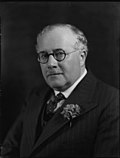
|
Kingsley Wood[24] MP for Woolwich West |
12 May 1940 | 21 September 1943† | Conservative | Churchill War (All parties) | ||
| | 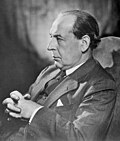
|
Combined Scottish Universities
|
24 September 1943 | 26 July 1945 | Independent )
(National | ||
| Churchill Caretaker (Con.–Lib.N.) | |||||||

|
Hugh Dalton[24] MP for Bishop Auckland |
27 July 1945 | 13 November 1947 | Labour | Attlee (I & II) | ||

|
Bristol South East[1817 5]
|
13 November 1947 | 19 October 1950 | Labour | |||

|
Hugh Gaitskell[24] MP for Leeds South |
19 October 1950 | 26 October 1951 | Labour | |||

|
26 October 1951 | 20 December 1955 | Conservative | Churchill III | |||
| Elizabeth II (1952–2022) | |||||||
| Eden | |||||||

|
Harold Macmillan[24] MP for Bromley |
20 December 1955 | 13 January 1957 | Conservative | |||

|
Peter Thorneycroft[24] MP for Monmouth |
13 January 1957 | 6 January 1958 | Conservative | Macmillan (I & II) | ||
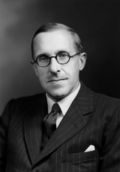
|
Derick Heathcoat-Amory[24] MP for Tiverton |
6 January 1958 | 27 July 1960 | Conservative | |||

|
Selwyn Lloyd[24] MP for Wirral |
27 July 1960 | 13 July 1962 | Conservative | |||
| | Reginald Maudling[32] MP for Barnet |
16 July 1962 | 16 October 1964 | Conservative | |||
| Douglas-Home | |||||||

|
Cardiff South East
|
17 October 1964 | 29 November 1967 | Labour | Wilson (I & II) | ||

|
Roy Jenkins[34] MP for Birmingham Stechford |
29 November 1967 | 19 June 1970 | Labour | |||
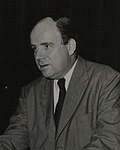
|
Enfield West
|
20 June 1970 | 20 July 1970† | Conservative | Heath | ||
Altrincham and Sale
|
25 July 1970 | 4 March 1974 | Conservative | ||||

|
Leeds East
|
5 March 1974 | 4 May 1979 | Labour | Wilson (III & IV) | ||
| Callaghan | |||||||

|
East Surrey
|
4 May 1979 | 11 June 1983 | Conservative | Thatcher I | ||

|
Nigel Lawson[24] MP for Blaby |
11 June 1983 | 26 October 1989 | Conservative | Thatcher II | ||
| | Thatcher III | ||||||

|
John Major[24] MP for Huntingdon |
26 October 1989 | 28 November 1990 | Conservative | |||

|
Norman Lamont[24] MP for Kingston-upon-Thames |
28 November 1990 | 27 May 1993 | Conservative | Major I | ||
| | Major II | ||||||

|
Kenneth Clarke[24] MP for Rushcliffe |
27 May 1993 | 2 May 1997 | Conservative | |||

|
Kirkcaldy and Cowdenbeath[1817 6]
|
2 May 1997 | 27 June 2007 | Labour | Blair (I, II & III) | ||

|
Edinburgh South West
|
28 June 2007 | 11 May 2010 | Labour | Brown | ||
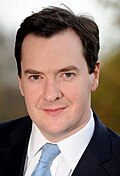
|
George Osborne[36] MP for Tatton |
11 May 2010 | 13 July 2016 | Conservative | Cameron–Clegg (Con.–L.D.) | ||
| Cameron II | |||||||

|
Runnymede and Weybridge
|
13 July 2016 | 24 July 2019 | Conservative | May I | ||
| May II | |||||||

|
Sajid Javid[38][39] MP for Bromsgrove |
24 July 2019 | 13 February 2020 | Conservative | Johnson I | ||
| | Johnson II | ||||||

|
Richmond (Yorks)
|
13 February 2020 | 5 July 2022 | Conservative | |||

|
Nadhim Zahawi[41] MP for Stratford-on-Avon |
5 July 2022 | 6 September 2022 | Conservative | |||
| | 
|
Kwasi Kwarteng[42] MP for Spelthorne |
6 September 2022 | 14 October 2022 | Conservative | Truss | |
Charles III (2022–present) | |||||||

|
South West Surrey
|
14 October 2022 | 5 July 2024 | Conservative | |||
| | Sunak | ||||||

|
Rachel Reeves MP for Leeds West and Pudsey |
5 July 2024 | Incumbent | Labour | Starmer | ||
- Prince of Wales served as prince regentfrom 5 February 1811.
- ^ Elected to a new constituency in the 1832 general election.
- ^ Elected to a new constituency in the 1865 general election.
- ^ Elected to a new constituency in the 1918 general election.
- ^ Elected to a new constituency in the 1950 general election.
- ^ Elected to a new constituency in the 2005 general election.
Timeline
1817–present

See also
Notes
- ^ a b c d Including constituencies for elected MPs.
References
- ^ "Salaries of Members of His Majesty's Government – Financial Year 2022–23" (PDF). 15 December 2022.
- ^ "Pay and expenses for MPs". parliament.uk. Retrieved 15 July 2024.
- ^ Martin, Ben (13 July 2016). "Who is Philip Hammond, Britain's new Chancellor, and what are likely to be his first steps?". The Telegraph. Archived from the original on 11 January 2022 – via www.telegraph.co.uk.
- ^ Joseph Haydn, Horace Ockerby (ed.): The Book of Dignities, 3rd edition, Part III (Political and Official), p. 164. W.H. Allen & Co., London 1894, reprinted by Firecrest Publishing Ltd, Pancakes, 1969.
- ^ Chrimes, Administrative History, pp. 62–63.
- ^ "George Osborne gives evidence on Budget to the Treasury Select Committee". ITV.COM. Retrieved 25 April 2022.
Chancellor of the Exchequer George Osborne gives evidence to the Treasury Select Committee.
- ISBN 0485171414. Retrieved 19 October 2021.
- ^ "Gordon Brown: Chancellor of the Exchequer". Encyclopedia II. Experiencefestival.com. Archived from the original on 2 November 2012. Retrieved 2 May 2010.
- ^ Ben Pimlott, Hugh Dalton (1985) pp 524–48.
- ^ "Monetary Policy | Monetary Policy Committee (MPC) | Framework". Bank of England. 6 May 1997. Archived from the original on 8 May 2010. Retrieved 2 May 2010.
- ^ Owen, James (19 December 2012). "Sir Isaac Newton – did you know?". The Royal Mint. Archived from the original on 1 June 2017. Retrieved 6 June 2017.
- ^ "History of Number 11 Downing Street". UK Government. Retrieved 16 October 2014.
- ^ "Local History". Burnham Parish Council. Archived from the original on 1 October 2011.
- ^ "Reluctant Chancellor makes a move to keep his mansion out of reach". Archived from the original on 5 June 2011. Retrieved 24 March 2010.
- ^ "What is the Budget Box? Why is it red?". Birmingham Mail. 27 October 2021. Retrieved 4 February 2022.
- ^ "Bye-bye budget box, hello backpack". The Guardian. 21 March 2011.
- ^ Darling, Alistair (2011). Back from the Brink.
- ^ "The Budget and Parliament". www.parliament.uk. Retrieved 12 December 2024.
- ^ Lydall, Ross (6 March 2008). "Chancellor names his preferred Budget tipple – a glass of plain London tap water". The Scotsman. Retrieved 2 May 2010.
- ^ Murphy, Joe (5 March 2008). "Darling chooses tap water for Budget Day to support Standard campaign". London Evening Standard. Retrieved 9 February 2012.
- ^ "November, 1943. Sir John Anderson, the Chancellor of the Exchequer, wearing traditional robes and holding his red budget box". Getty Images. Archived from the original on 18 February 2015. Retrieved 18 February 2015.
- ^ "Portrait of Churchill in the robes of wearing his robes as Chancellor of the Exchequer, by John Singer Sargent, 1929. © National Trust Collections". 4 December 2012.
- ^ Vina, Gonzalo (10 December 2010). "www.bloomberg.com". Bloomberg.
- ^ a b c d e f g h i j k l m n o p q r s t u v w x y z aa ab ac ad ae af ag ah ai aj ak al am an ao ap aq ar as at au av aw ax ay az ba bb bc bd be bf bg bh bi bj bk bl bm bn bo bp bq br bs bt bu bv bw bx by bz ca cb cc cd ce cf cg ch ci cj ck cl cm cn co cp cq cr cs ct cu cv cw cx cy cz da db dc dd de df dg dh "Past Chancellors of the Exchequer". gov.uk. Government of the United Kingdom. Retrieved 7 September 2017.
- ^ "No. 16611". The London Gazette. 9 June 1812. p. 1111.
- Consolidated Fund Act 1816 (c. 98). 1816 [Regnal 56 Geo. 3]. § 2.
- OL 13505280M.
- ^ "No. 17893". The London Gazette. 4 February 1823. p. 193.
- ^ "No. 18356". The London Gazette. 27 April 1827. p. 937.
- ^ "No. 18394". The London Gazette. 7 September 1827. p. 1892.
- ^ "No. 28129". The London Gazette. 17 April 1908. p. 2937.
- ^ "No. 42733". The London Gazette. 17 July 1962. p. 5731.
- ^ "No. 43470". The London Gazette. 23 October 1964. p. 9014.
- ^ "No. 44469". The London Gazette. 5 December 1967. p. 13287.
- ^ "No. 58389". The London Gazette. 11 July 2007. p. 9979.
- ^ "No. 59425". The London Gazette. 21 May 2010. p. 9405.
- ^ "Philip Hammond appointed chancellor". BBC News. 13 July 2016. Retrieved 7 July 2017.
- ^ "Sajid Javid confirmed as chancellor". The Guardian. 24 July 2019. Retrieved 24 July 2019.
- ^ "Sajid Javid resigns as chancellor". BBC News. 13 February 2020. Retrieved 13 February 2020.
- ^ "Who is Rishi Sunak? Meet Sajid Javid's replacement as Chancellor". Evening Standard. 13 February 2020. Retrieved 13 February 2020.
- ^ "Nadhim Zahawi made chancellor after Rishi Sunak resigns - as Steve Barclay replaces Sajid Javid as health secretary". Sky News. 5 July 2022. Retrieved 5 July 2022.
- ^ "Kwasi Kwarteng is the UK's new chancellor". POLITICO. 6 September 2022. Retrieved 28 September 2022.
- ^ "Jeremy Hunt made chancellor after Liz Truss sacks Kwasi Kwarteng". Sky News. 14 October 2022. Retrieved 14 October 2022.
- ^ Giles, Chris (25 October 2022). "Jeremy Hunt to remain as Chancellor". BBC News. Retrieved 25 October 2022.
Further reading
- Barber, Stephen. "'Westminster's wingman'? Shadow chancellor as a strategic and coveted political role." British Politics 11.2 (2016): 184–204.
- Baxter, Stephen B. The Development of the Treasury, 1660–1702 (1957) online
- Browning, Peter. The Treasury and Economic Policy: 1964–1985 (Longman, 1986).
- Dell, Edmund. The Chancellors: A History of the Chancellors of the Exchequer, 1945–90 (HarperCollins, 1997) 619pp; 17 chapters covering the terms of each chancellor.
- Holt, Richard. Second Amongst Equals: Chancellors of the Exchequer and the British Economy (Profile Books, 2001).
- Jenkins, Roy. The Chancellors (1998); 497pp; covers entire career as well as term in office of 19 chancellors from 1886 to 1947.
- Kynaston, David. The chancellor of the exchequer (T. Dalton, 1980).
- Peden, G. C. The Treasury and British Public Policy, 1906–1959 (Oxford UP, 2000). online
- Seldon, Anthony. The Impossible Office? The History of the British Prime Minister (2021) excerpt major scholarly history. Covers the relations with Prime Minister in Chapter 9.
- Vincent, Nicholas C. "The Origins of the Chancellorship of the Exchequer." English Historical Review 108.426 (1993): 105–121. in JSTOR
- Woodward, Nicholas. The management of the British economy, 1945–2001 (Manchester University Press, 2004).







